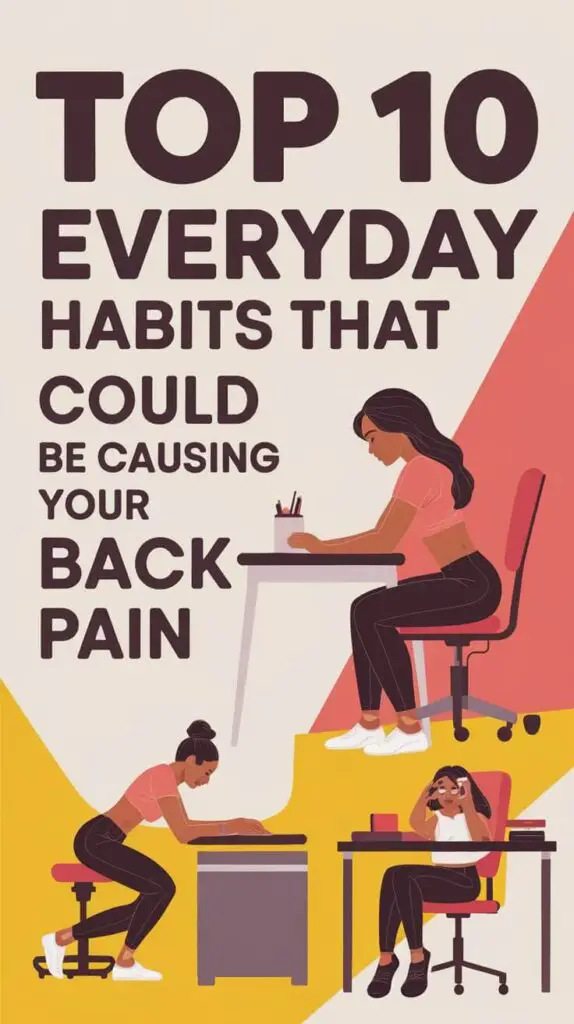If you are constantly struggling with back pain, you might be unknowingly contributing to it through your daily habits. Back pain can creep into your life slowly, especially when small, repeated actions strain your spine over time. I learned this the hard way after experiencing recurring discomfort that started interfering with my routine. It wasn’t until I dug deeper into my habits that I realized how much they were affecting my back health.

Here are 10 common habits that could be causing your back pain, along with tips to help you avoid them.
1. Poor Posture
Slouching while sitting or standing can put extra pressure on your spine, leading to discomfort. Whether you’re sitting at your desk, lounging on the couch, or scrolling through your phone, maintaining proper posture is crucial.
Personal Tip: I used to work long hours hunched over my laptop, which led to severe lower back pain. I now use an ergonomic chair and make sure my screen is at eye level to avoid slouching.
2. Prolonged Sitting
Sitting for extended periods can stiffen your muscles and weaken your lower back over time. It also reduces blood flow to your spine, which can contribute to pain.
What to Do: Take short breaks every 30-60 minutes to stretch or walk around. These micro-movements can make a big difference.
3. Improper Lifting Technique
Lifting heavy objects without using proper form is a major cause of back injuries. Bending at the waist instead of your knees can strain your spine.
What to Do: Always bend your knees and use your legs to lift heavy objects. If something feels too heavy, ask for help.
4. Sleeping on the Wrong Mattress
Your mattress plays a significant role in supporting your spine. A mattress that is too soft or too firm can misalign your back, causing discomfort.
What to Do: Choose a medium-firm mattress that provides support while contouring to your body. If you’re unsure, test a few options before committing to one.
5. Carrying Heavy Bags
Carrying a heavy purse, backpack, or laptop bag on one shoulder creates an imbalance in your posture, leading to back strain.
What to Do: Opt for a backpack that distributes weight evenly across both shoulders, or lighten your load by carrying only what you need.
Personal Insight: I used to carry a heavy messenger bag daily, and switching to a lightweight backpack made a noticeable difference in my back pain.
6. Skipping Regular Exercise
A sedentary lifestyle can weaken the muscles that support your spine, making you more prone to back pain.
What to Do: Incorporate exercises that strengthen your core, such as planks or yoga. Even light activities like walking can improve your back health.
7. Wearing the Wrong Shoes
Shoes with poor support, such as high heels or flat sandals, can throw off your balance and lead to back pain.
What to Do: Invest in shoes with proper arch support and cushioning, especially if you’re on your feet for long hours.
Personal Experience: After switching to supportive sneakers for daily walks, I noticed my back pain reduced significantly.
8. Excessive Screen Time
Constantly looking down at your phone or laptop strains your neck and upper back. This is often referred to as “tech neck.”
What to Do: Hold your phone at eye level and use a stand for your laptop to prevent straining your neck.
9. Stress and Tension
Emotional stress can lead to muscle tension, particularly in your back and shoulders. This tension can cause or worsen back pain over time.
What to Do: Practice stress-relieving activities such as meditation, deep breathing, or hobbies you enjoy.
10. Ignoring Early Signs of Back Pain
It’s easy to dismiss occasional back pain as minor, but ignoring it can allow the problem to worsen.
What to Do: Pay attention to your body and seek medical advice if the pain persists or intensifies. Early intervention can prevent long-term issues.
Conclusion
Back pain can be frustrating, but the good news is that many of its causes are within your control. By identifying and changing harmful daily habits, you can reduce discomfort and improve your overall quality of life.
When I started paying attention to these habits, I noticed a remarkable improvement in my back health. Small adjustments, like using a supportive chair, standing up more often, and carrying lighter bags, made all the difference.
